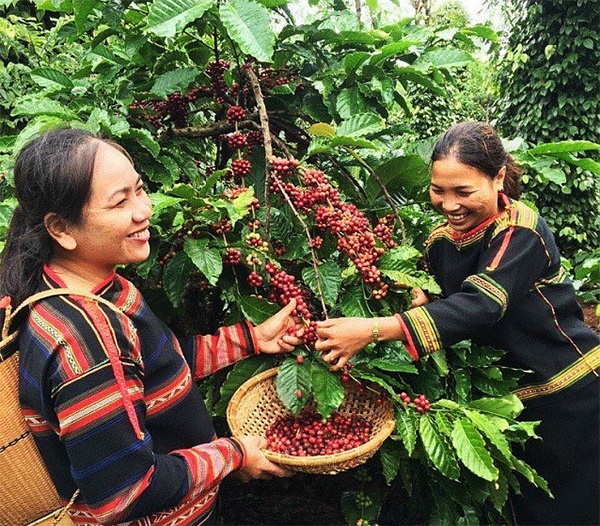EU-financed project tackles sustainable landscape management
 |
| EU-financed project tackles sustainable landscape management |
The Ministry of Agriculture and Rural Development (MARD) coordinated with the United Nations Development Programme (UNDP) in Vietnam, the Provincial People’s Committees of Dak Nong and Lam Dong, and other partners in launching a new project entitled Integrated Sustainable Landscape Management Through Deforestation-Free Jurisdiction project in Lam Dong and Dak Nong, Vietnam, funded by the European Union. The kick-off workshop in Da Lat was chaired by MARD Vice Minister Le Quoc Doanh and attended by more than 70 participants.
Natural forests in Vietnam, like most in other countries, are facing a paradox. On the one hand, they are recognised as an invaluable source of goods and services sustaining the livelihoods of millions of people, as well as supporting vital ecological services such as climate regulation and biodiversity. On the other hand, those populations which are directly dependent on natural forests and play a major role in forest protection are frequently also the poorest and have fewer economic opportunities than populations living in urban areas.
Vietnam’s Central Highlands has been facing a significant loss of natural forests due to replacements with plantation forests. From 2005 to 2020, the natural forest area in the highlands was reduced from 2.83 million to 2.18 million hectares, while the planting area for coffee increased from 449,400 to 577,100 hectares, for rubber from 86,900 to 259,200 hectares, and for timber from 144,420 to 368,700 hectares.
In addition, the degradation of agricultural lands due to chemical pollution and soil erosion has also become extremely serious and has led the highlands to account for 22 per cent of Vietnam’s natural emissions. Each year, approximately 6.8 million of CO2 are released from coffee farms in the Central Highlands from fertilisers, residues, and fuel.
In order to transition towards a model of sustainable landscape management without deforestation, the new EU-financed project in Lam Dong and Dak Nong will be developing and piloting an integrated approach to ecosystem management and protection by creating sustainable incomes from the forest that will enable farmers to stay on their own land and contribute to improved livelihoods for people living near forests.
In his remarks at the workshop, Jesus Lavina, first counsellor and deputy head of the Cooperation Department of the Delegation of the European Union to Vietnam said, “The project’s three specific objectives – to enhance forest ecosystems, improve livelihoods, and sustain food production – are highly relevant in the Central Highlands and fully aligned with policies and strategies of both Vietnam and the European Union. Joining our forces in tackling deforestation and forest degradation will bring positive impacts to local communities, including the most vulnerable indigenous peoples who rely heavily on forest ecosystems.”
Patrick Haverman, deputy resident representative of UNDP Vietnam, said: “The project is designed to use a deforestation-free jurisdictional approach, which is a holistic framework to demonstrate sustainable development without deforestation in a particular jurisdiction as a key to achieve the expected results. This is an innovative idea that has been accepted globally.”
Haverman also emphasised that the project will make significant contributions to sustainable forestry development in the Central Highlands and implement the Vietnam Forestry Development Strategy for the 2021-2030 period with a vision for 2050, as well as the recently approved Strategy for Sustainable Agriculture and Rural Development for 2021-2030.
The project has been highly appreciated by the government as an important and relevant initiative to directly contribute to and promote the implementation of the Sustainable Development Goals, as well as national strategies and commitments to reducing greenhouse gas emissions, green growth, forest protection, and the sustainable agricultural development of both Vietnam in general and the Central Highlands region in particular.
The project will be implemented over the course of four years (2022–2026) in Lam Dong and Dak Nong provinces. The project’s targets by 2026 are to protect 25,000 hectares of natural forest; reduce harmful CO2 emissions by 3 million tonnes; enable 35 per cent of the project area’s marginalised populations in both provinces to benefit from improved livelihoods, especially women and ethnic minorities; and increase the total value of commodities in the project area by 25 per cent. Its results will be replicated and integrated into Vietnam’s development strategies and policies.
The total budget of the project is €5 million ($5.3 million), funded by the EU through UNDP Vietnam. The Vietnam Forestry Administration and the Departments of Agriculture and Rural Development of Dak Nong and Lam Dong provinces are the project owners.
Four international organisations are also providing additional technical assistance to the project: the International Center for Tropical Agriculture, the European Forest Institute, the Sustainable Trade Initiative, and the United Nations Environment Programme.
What the stars mean:
★ Poor ★ ★ Promising ★★★ Good ★★★★ Very good ★★★★★ Exceptional
Related Contents
Latest News
More News
- Trung Nam-Sideros River consortium wins bid for LNG venture (January 30, 2026 | 11:16)
- Vietnam moves towards market-based fuel management with E10 rollout (January 30, 2026 | 11:10)
- Envision Energy, REE Group partner on 128MW wind projects (January 30, 2026 | 10:58)
- Vingroup consults on carbon credits for electric vehicle charging network (January 28, 2026 | 11:04)
- Bac Ai Pumped Storage Hydropower Plant to enter peak construction phase (January 27, 2026 | 08:00)
- ASEAN could scale up sustainable aviation fuel by 2050 (January 24, 2026 | 10:19)
- 64,000 hectares of sea allocated for offshore wind surveys (January 22, 2026 | 20:23)
- EVN secures financing for Quang Trach II LNG power plant (January 17, 2026 | 15:55)
- PC1 teams up with DENZAI on regional wind projects (January 16, 2026 | 21:18)
- Innovation and ESG practices drive green transition in the digital era (January 16, 2026 | 16:51)

 Tag:
Tag:

























 Mobile Version
Mobile Version